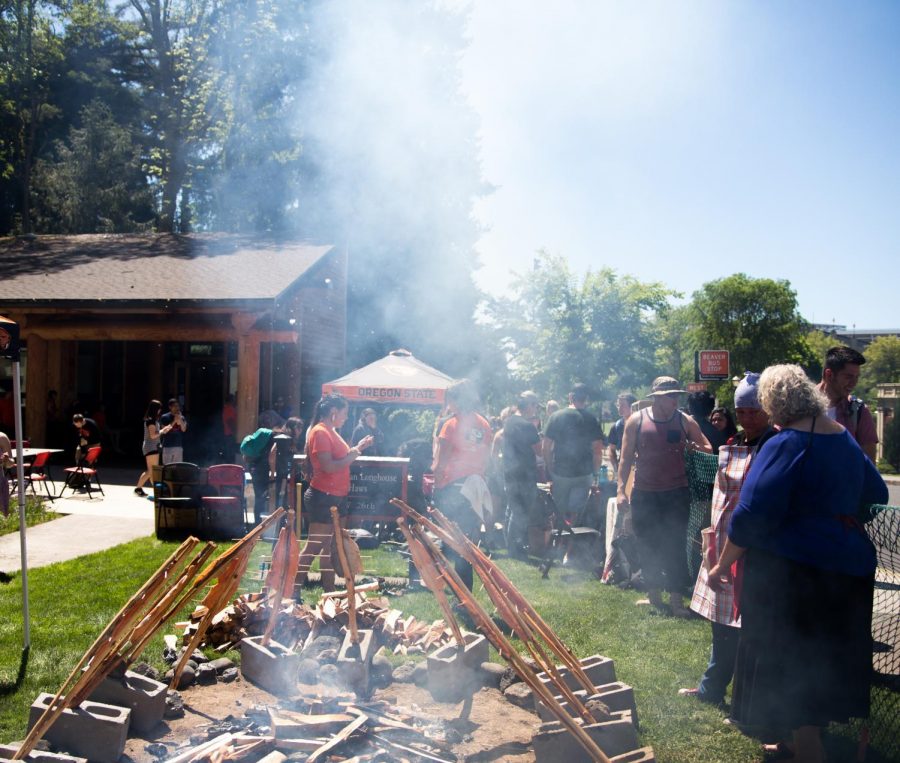Annual Salmon Bake serves 1,050, shows cultural pride
May 22, 2017
The fire roared beneath skewered fillets. Community members gathered in awe as the salmon sizzled over the heat. A line of people waiting to dine on freshly-cooked fish wrapped around the building and down the sidewalk.
On Friday, May 19, the Native American Longhouse Eena Haws hosted the 19th Annual Salmon Bake at the Longhouse. The event hosted 1,050 Oregon State University community members, including university students and staff, as well as Corvallis residents and tribal elders, according to the event’s Facebook page.
Salmon is a large part of Native American culture in the Pacific Northwest, according to Ame Mañon-Ferguson, a fourth-year student studying fisheries and wildlife science and a Native American Longhouse Eena Haws student leadership liaison. The Salmon Bake is a way to show that Native Americans are present in the community and not just a demographic discussed in textbooks.
“It’s kind of reminding people that we’re still here and sharing a little bit of that with the community,” Mañon-Ferguson said.
At the event, salmon fillets were cooked on long wooden skewers over a hand-built fire. According to Mañon-Ferguson, 30 roughly 10-pound salmon were purchased for this year’s event.
“The salmon, we normally try to get it from a tribal fisherman,” Mañon-Ferguson said. “Luckily, we were able to do that this year.”
The salmon for the event came from a fisherman that fishes directly on the Columbia River through treaty rights, overseen by the Columbia River Intertribal Fish Commission, according to Luhui Whitebear, the assistant director of the Native American Longhouse Eena Haws.
“This is a way to have it when the spring runs are, to honor the salmon coming back in the spring and for people to learn more about salmon culture. It is also to celebrate that part of the culture along with the salmon returning,” Whitebear said.
To help purchase the salmon for this year’s event, the Native American Longhouse Eena Haws received funding from the Siletz Tribal Charitable Community Fund and the Cow Creek Band of Umpqua Indians, according to Whitebear.
“For us, it’s really important to support tribal fishers in this effort and I think the tribes appreciate that as well. We applied for funding specifically to help support that part of salmon culture,” Whitebear said.
Although this year’s event celebrates the return of salmon to the river in the spring, according to Mañon-Ferguson, the number of salmon returning each year continues to diminish.
“This year we have added a new component that’s become more and more common in the salmon bake, which is tabling, specifically about the environment problems that are affecting salmon,” Mañon-Ferguson said.
According to Tucker Ford, a sophomore in pre-education and history and a member of the Native American Student Association, the cooked salmon was very different from any other salmon he had ever had before.
“I’d never been to a salmon bake, either, so it was different. I don’t like salmon actually, I’m not a fan. Ate it all today though,” Ford said. “It was just a different way to cook it and way better in my opinion. You could just eat the food and just really taste how natural it was.”
Side dishes such as cornbread, kale salad, garlic roasted potatoes and blueberry buckle were served alongside the salmon, according to the event’s Facebook page. Fish head soup was also prepared, but had priority for tribal elders.
According to Whitebear, many tribal elders attend the salmon bake event each year.
“Elders have a very specific place in our communities and a lot of respect is placed on them, so we always make sure we have seating for them and they eat first and everything like our customs,” Whitebear said.
Beyond tribal elders and individuals that identify as Native American, the Salmon Bake, as well as the Native American Longhouse Eena Haws, are open to all who are committed to transformative learning, according to the event’s Facebook page.
The annual Salmon Bake provides a great experience to bring the community together, according to Whitebear.
“For some people, it’s the first time they’ve come to the Longhouse, just walking through, so maybe they’ll come back and hang out sometime,” Whitebear said. “It’s a great way for the staff to all work together as a team to show the whole campus and surrounding communities that come the kind of things that are important to them.”
























































































































